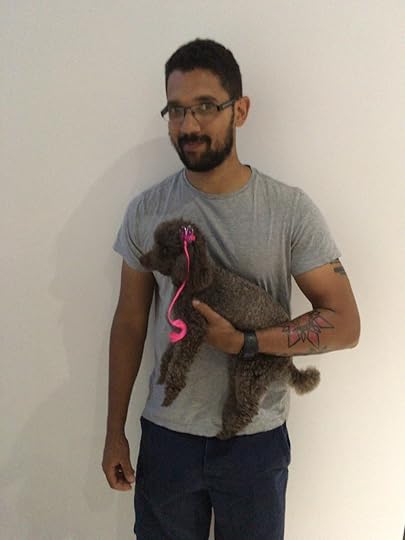Hayley Chewins's Blog, page 5
January 22, 2018
i am afraid of everything
October 23, 2017
twenty-nine things i've learnt in twenty-nine years
August 11, 2017
how to decide what to write next
July 17, 2017
on smallness
June 20, 2017
how to come up with ideas
June 9, 2017
what my hair taught me about writing
May 27, 2017
how to find your voice
May 19, 2017
how to hope
If you’re a creative person trying to Make a Thing, you’ve probably met your fair share of people who’ve told you that it’s dangerous to hope.
They’ve probably told you this with a tilted head and well-meaning sympathy in their eyes, as though they Know Better.
They’ve probably said, “Don’t get me wrong, you should write that book/paint that portrait/design that line of poodle-shaped ceramics—just don’t expect anything from it. That way, you won’t feel let down when it doesn’t work out.”
To be fair, you’ve probably even told yourself this.
(Well, if you’re me, you have.)
I’ve had people say this kind of thing to me a lot.
But I have this really revolutionary way of dealing with it. (Not really.)
I simply don’t listen.
See, if I listened, I would lose hope pretty quickly. And I can’t afford to do that.
Because I run on hope.
Hope is the petrol I put in my tank. It’s what kindles my creative fire. Hope is the thing that keeps me going. (Okay, and coffee.) Bottom line is: if I’m not hoping, I’m not working.
What do I mean by hoping?
I mean that when I’m writing a book, I believe all the good things it is possible to believe about a book.
I believe my agent will love it. I believe it will sell. I believe it will find an audience. I believe people will adore it as much as I do.
It’s not easy. In fact, it’s pretty hard to maintain a sense of hope in what sometimes feels like a never-ending maelstrom of Horrible Things.
But I do it anyway.
Because it’s the only thing I can do.
So in case you need a top up, here are some of the things I do to keep the positive vibes alive:
I give myself pep talks
Sometimes I’ll be like that bunny in the “you’re gonna do great today” meme and I’ll literally stand in front of a mirror and tell myself to keep going.
Sometimes I’ll write emails to myself when I’m backing up drafts of a manuscript. (When I was doing this for THE TURNAWAY GIRLS, I sent an email to myself that said, ‘Keep going. This is going to be your debut.’)
Often, in the mornings, while I’m having my first cup of coffee, I’ll write down all my dreams for a particular project.
Some days I don’t need a pep talk. Other days, I need three. (I find this is directly proportionate to the amount of time I’ve spent with The Head Tilters.)
A pep talk can be a flurry of words typed out on your laptop, or a whisper to yourself in the quiet of the evening.
It can be anything, as long as its central message reminds you why you’re Making a Thing and pushes you to keep going.
I hang out in bookshops
Bookshops are basically rooms full of realised dreams. They’re physical, touchable proof that the book I’m writing has the potential to become real.
Pick up a book in your genre. Run your hand over the cover. Feel its weight. Smell its pages.
Can you picture your book? Great. Now go home and write it.
(Note: you can adjust this technique to suit anything you’re trying to make. If you’re painting, go look at some paintings. If you’re making furniture, go to a design expo, etc.)
I block out negativity
Okay, so what if you’re at a dinner party and you tell someone you’re writing a book and they look at you in a way that makes you feel like you’re about the size of a grain of salt? Yeah. We’ve all been there. I don’t really have advice for that situation because it sucks and basically the only solution is to cry your eyes out and then fill yourself up with hope again.
But here’s my advice for avoiding all the pain to begin with:
DON’T TELL ANYONE YOU’RE WRITING A BOOK.
Seriously.
Or, only tell people who will hold your dreams with the delicate wonder they deserve.
You don’t have to tell anyone your creative secrets. You don’t owe anyone an explanation for how you’re spending your time. Keep your impossible dreams safe until they’re strong enough to face the critics.
I have conversations with my future self
I like to do this in the evenings, when everything’s quiet and tinted with purple. I lie on my bed, or on the floor. I close my eyes. I picture meeting my future self in my favourite coffee shop. I ask her how things are going and imagine the best possible answers.
I remember all the crazy, improbable, wonderful things that have happened to me already
I was born. (Seriously, look up the statistics on that one.) I met the love of my life in a coffee shop when I was eighteen. I sent poems out randomly and without query letters and somehow they were published before I was 20. I connected with my (perfect) agent. My (amazing) editor bought my book. I've received funding and met incredible people and I have the best poodle in the world.
These are just a few examples.
So much of our lives is miracle.
I keep working
If hope begets work, then work begets hope, too. Enough said.
If you run on hope, don’t let the world tell you you’re naïve or childish or silly for believing in your work.
Hoping is a radical act. It’s a rebellion.
Hoping is getting up every day and working and working and working even though you don’t know if your book will sell or your opera will be appreciated or your sculpture will find its way into someone’s living room.
You’re brave and strong and amazing, and you can do this.
We can all do this.
(I just realised this whole blog post is a pep talk.)
(You’re welcome.)
(I needed it, too.)
February 27, 2017
how a poodle changed my life
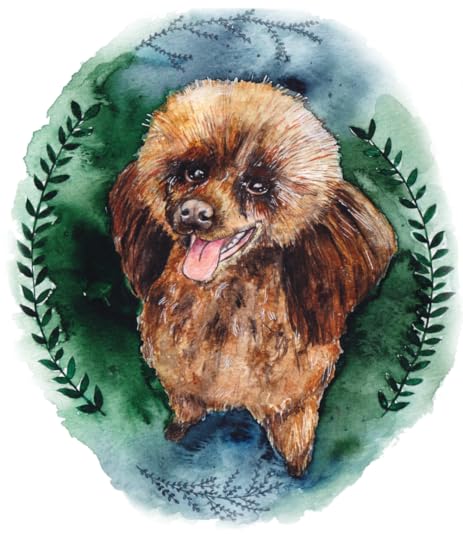
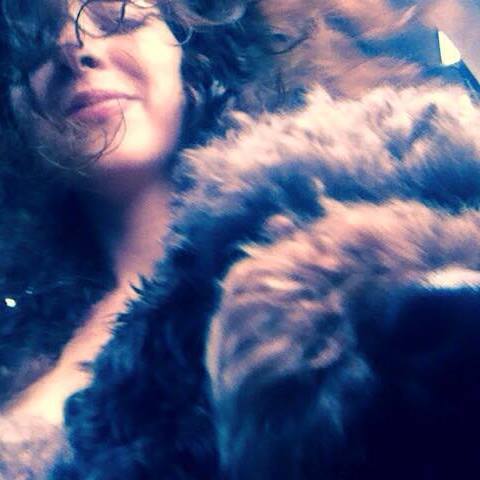
I was twenty-two years old. I had just started law school. And I was obsessed with one word—poodle.Yep. You read that right. Poodle.But why? Why was I thinking about a curly-haired water dog? I couldn’t have told you. I only knew that the word was there, and that it wouldn’t leave me alone.So I did what any other sane person would do. I started googling.I learnt about the history of poodles. Did you know, for instance, that toy poodles were bred so that they could fit inside the muffs of Russian princesses to keep their hands warm? I learnt about the fact that, unlike most dogs, their hair doesn’t fall out. It just grows and grows and grows until it covers their eyes and ears and feet. And, much to the delight of my friend Kate, I spent hours during lectures looking up pictures of the different colours they came in. (She’s a human rights lawyer now and still laughs about this.)But knowing about them wasn’t enough.I wanted one of my own.So one night, when my then-boyfriend-now-husband and I were eating at our favourite sushi place, I decided to bring it up. “What would you say,” I said, “if I told you I wanted to get a poodle?” (We were living together at the time. He needed to be consulted.) He dropped his chopsticks on the table. The first word out of his mouth was no. He didn’t like them, he said. They were lap dogs, silly dogs. Dogs with funny hairstyles and small brains.***Luckily I had done the research. I managed to refute each of his arguments, one by one. In fact, I could say that attending law school taught me to argue for poodle ownership more than anything else.He held to his opinion. But that didn’t stop me. I started building a case.I looked up reputable breeders and researched rescue organisations. I joined a forum. I read about training, personality, breeding, temperament, grooming. I found a nearby puppy school.It wouldn’t be an over-exaggeration to say that by the time I got my puppy—a brown toy poodle named Delphi—I was completely obsessed.
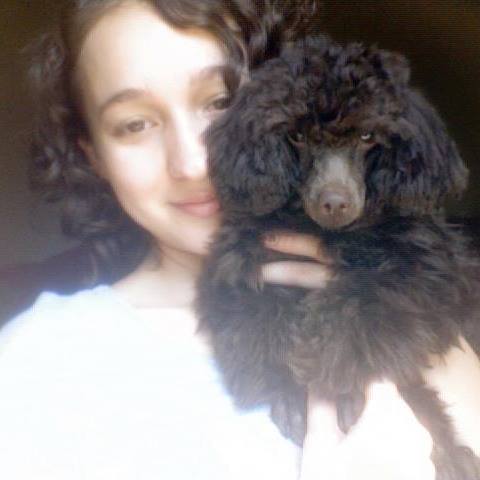
We fetched her at the airport because she had flown in from Cape Town. When we walked up to her crate she was scratching at the bars, whining. I unlatched the door and she leapt into my arms, a ball of brown cotton wool no bigger than a guinea pig. She licked frantically at my cheek as if to say, You’ve saved me!But the truth was quite the opposite.There’s something that I’ve been thinking about a lot since then. It’s this thing of paying attention to what you pay attention to. What obsesses you. What won’t leave you alone. The word poodle was like that for me. It came out of nowhere. I had never owned a poodle. No one in my family had ever owned a poodle. I’d never even met a poodle. I’d never thought about them at all. And then, suddenly, out of the blue: poodle, poodle, poodle.It was almost like a didn’t have a choice in the matter.When Delphi was a puppy, I used to take her everywhere with me. For the first month or so, she wouldn’t even walk anywhere on her own four feet. She had to be held. Constantly. She was tiny and the world was big and she was afraid most of the time. So I never left her alone. I took her to coffee shops, to the DVD store, to the bookshop, to university. And whenever I bumped into people I knew, their very first reaction would be something along the lines of: “What is that? Is that a dog? It looks more like a rodent.”Yeah. Turns out, there are a lot of people who don’t like poodles.But you know what? I found that I really didn’t care what people said or thought. Which was a first for me.I loved Delphi. She loved me. That was enough.The most powerful thing about me getting a poodle was this: I was being me. Doing me. For the first time in a long time, perhaps in my life, I had made a choice for myself based on who I was and what I liked. I wanted a dog who slept on my lap while I read, who was clever and loving and clingy. And so I got Delphi. And it didn’t bother me that people didn’t particularly like her.It seems like a small choice, but it was huge for me.Once I could say, “I love my poodle,” I found I could say something else: “I want to write a novel.”
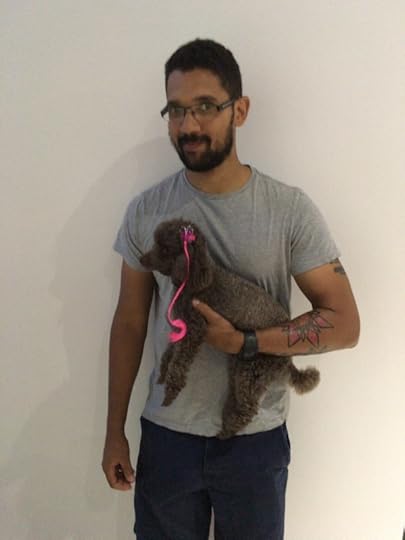
And then I became obsessed with another word. Writer.I started writing.I wrote and wrote and wrote while Delphi lay on my stomach, or tucked between my ankles.I never stopped.About a month before Delphi turned five, I sold my first book.The main character in my debut, THE TURNAWAY GIRLS, is called Delphernia Undersea. She’s not named after my dog—at the time I simply liked the sound of the name and that’s why I chose it—but I don’t think it’s a coincidence that there’s a little bit of Delph in my first book. Without her, there probably wouldn’t be a book.She taught me how to say, “I love.”She taught me how to say, “I want.”What could be more life-changing than that? *** It should be noted that my husband is now Delphi's biggest fan. I convinced him; she stole his heart. See photo evidence.
HOW A POODLE CHANGED MY LIFE
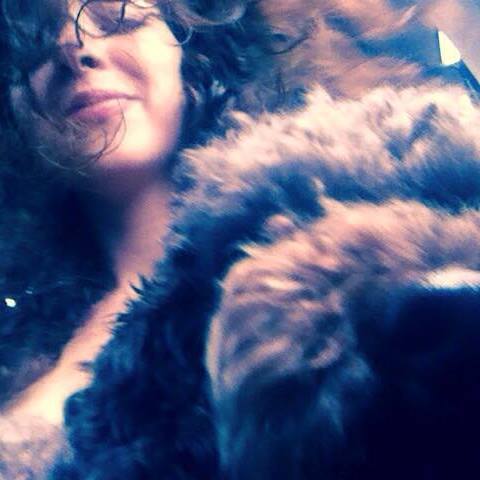
I was twenty-two years old. I had just started law school. And I was obsessed with one word—poodle.
Yep. You read that right. Poodle.
But why? Why was I thinking about a curly-haired water dog? I couldn’t have told you. I only knew that the word was there, and that it wouldn’t leave me alone.
So I did what any other sane person would do. I started googling.
I learnt about the history of poodles. Did you know, for instance, that toy poodles were bred so that they could fit inside the muffs of Russian princesses to keep their hands warm? I learnt about the fact that, unlike most dogs, their hair doesn’t fall out. It just grows and grows and grows until it covers their eyes and ears and feet. And, much to the delight of my friend Kate, I spent hours during lectures looking up pictures of the different colours they came in. (She’s a human rights lawyer now and still laughs about this.)
But knowing about them wasn’t enough.
I wanted one of my own.
So one night, when my then-boyfriend-now-husband and I were eating at our favourite sushi place, I decided to bring it up. “What would you say,” I said, “if I told you I wanted to get a poodle?” (We were living together at the time. He needed to be consulted.) He dropped his chopsticks on the table. The first word out of his mouth was no. He didn’t like them, he said. They were lap dogs, silly dogs. Dogs with funny hairstyles and small brains.***
Luckily I had done the research. I managed to refute each of his arguments, one by one. In fact, I could say that attending law school taught me to argue for poodle ownership more than anything else.
He held to his opinion. But that didn’t stop me. I started building a case.
I looked up reputable breeders and researched rescue organisations. I joined a forum. I read about training, personality, breeding, temperament, grooming. I found a nearby puppy school.
It wouldn’t be an over-exaggeration to say that by the time I got my puppy—a brown toy poodle named Delphi—I was completely obsessed.

We fetched her at the airport because she had flown in from Cape Town. When we walked up to her crate she was scratching at the bars, whining. I unlatched the door and she leapt into my arms, a ball of brown cotton wool no bigger than a guinea pig. She licked frantically at my cheek as if to say, You’ve saved me!
But the truth was quite the opposite.
There’s something that I’ve been thinking about a lot since then. It’s this thing of paying attention to what you pay attention to. What obsesses you. What won’t leave you alone. The word poodle was like that for me. It came out of nowhere. I had never owned a poodle. No one in my family had ever owned a poodle. I’d never even met a poodle. I’d never thought about them at all. And then, suddenly, out of the blue: poodle, poodle, poodle.
It was almost like a didn’t have a choice in the matter.
When Delphi was a puppy, I used to take her everywhere with me. For the first month or so, she wouldn’t even walk anywhere on her own four feet. She had to be held. Constantly. She was tiny and the world was big and she was afraid most of the time. So I never left her alone. I took her to coffee shops, to the DVD store, to the bookshop, to university. And whenever I bumped into people I knew, their very first reaction would be something along the lines of: “What is that? Is that a dog? It looks more like a rodent.”
Yeah. Turns out, there are a lot of people who don’t like poodles.
But you know what? I found that I really didn’t care what people said or thought. Which was a first for me.
I loved Delphi. She loved me. That was enough.
The most powerful thing about me getting a poodle was this: I was being me. Doing me. For the first time in a long time, perhaps in my life, I had made a choice for myself based on who I was and what I liked. I wanted a dog who slept on my lap while I read, who was clever and loving and clingy. And so I got Delphi. And it didn’t bother me that people didn’t particularly like her.
It seems like a small choice, but it was huge for me.
Once I could say, “I love my poodle,” I found I could say a whole bunch of other things.
I could say, “I don’t want to be a lawyer.”
I could say, “I want to write a novel.”
And then I became obsessed with another word. Writer.
I started writing.
I wrote and wrote and wrote while Delphi lay on my stomach, or tucked between my ankles.
I never stopped.
About a month before Delphi turned five, I sold my first book.
The main character in my debut, THE TURNAWAY GIRLS, is called Delphernia Undersea. She’s not named after my dog—at the time I simply liked the sound of the name and that’s why I chose it—but I don’t think it’s a coincidence that there’s a little bit of Delph in my first book. Without her, there probably wouldn’t be a book.
She taught me how to say, “I love.”
She taught me how to say, “I want.”
What could be more life-changing than that?
*** It should be noted that my husband is now Delphi's biggest fan. I convinced him; she stole his heart. See photo evidence below:
